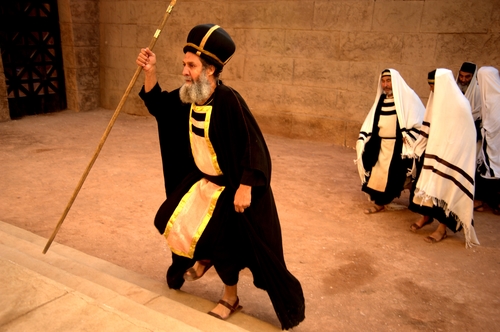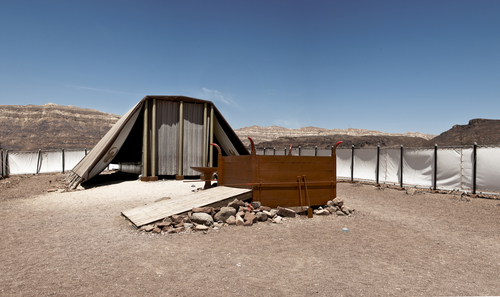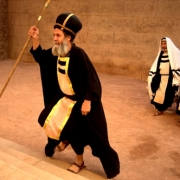The Child and the Son
/0 Comments/in Weekly Devotional/by David GuzikFor unto us a Child is born, unto us a Son is given; and the government will be upon His shoulder. And His name will be called Wonderful, Counselor, Mighty God, Everlasting Father, Prince of Peace. (Isaiah 9:6)
In the computer age, it’s pretty easy to give our words emphasis when we write. You just use a bigger, bolder, or different color font. Ancient writers didn’t have these tools, but they did have emphasis. In the Old Testament, one of the most common ways to make a point was to repeat it, usually using slightly different words.

When Isaiah wrote, unto us a Child is born, unto us a Son is given, he used this tool of repetition to emphasize the point. Yet we recognize the hand of the Holy Spirit in the specific wording.
It starts out, unto us a Child is born. This tells us that the victory-bringing Messiah would be a man. Theoretically, the Messiah could have been an angel, or even God without humanity. But only a true man could be our Savior and High Priest as Jesus is. The Child had to be born. What amazing mystery! There is nothing weaker, more helpless, more dependent than a Child.
Isaiah continued: unto us a Son is given. This would be more than a man. He is also the eternal Son of God, the Second Person of the Godhead. The Messiah wasn’t just a sinless angel or a perfect man like Adam. We needed a perfect, infinite Being to offer a perfect, infinite atonement for our sins. We needed Immanuel, God with us (Isaiah 7:14).
Thinking a little deeper, we see that the Child could be born, because the humanity of Jesus had a starting point. There was a time when humanity had not yet been added to His deity. The Son had to be given, because the Second Person of the Trinity is eternal, and He has existed forever as the God the Son – even before He added humanity to His deity.
While Isaiah may have intended the repetition merely for the sake of emphasis, we see that the Holy Spirit beautifully guided every word! Jesus, the Messiah, is fully God and fully man. There was a time when the eternal Son of God, the Second Person of the Holy Trinity, added humanity to His deity. He never became less God, but He added a human nature to His divine nature, and so He became one person with two distinct natures, functioning together in perfect harmony.
If Jesus were not fully man, He could not stand in the place of sinful man and be a substitute for the punishment humanity deserves. If He were not fully God, His sacrifice wouldn’t be perfect and therefore wouldn’t be enough to satisfy God’s perfect standard. If Jesus is not fully God and fully man, we remain lost in our sin. We can say, “Thank you Lord, for the Child born and the Son given.”
Ein König und Priester
/0 Comments/in Wöchentliche Andacht/by David GuzikUnd als der König aus Damaskus kam und den Altar sah, trat er zu dem Altar und opferte darauf, und er verbrannte darauf sein Brandopfer und sein Speiseopfer und goß sein Trankopfer darauf und sprengte das Blut der Friedensopfer, die er darbrachte, auf den Altar. (2. Könige 16,12-13)
König Ahas von Juda hatte sich zum Untertanen vom König von Assyrien gemacht, was beschämend war für einen Führer von Gottes Volk, denn er verbeugte sich vor einem heidnischen Herrscher. Ahas gefiel das Design vom Altar des heidnischen Tempels in Damaskus und er wollte dieses Design auch für Jerusalem. All das war schlimm, doch was Ahas als nächstes tat, war noch schlimmer.

Wir lesen, Ahas verbrannte darauf sein Brandopfer und sein Speisopfer und goß sein Trankopfer darauf und sprengte das Blut der Friedensopfer, die er darbrachte, auf den Altar. In Israel galt das strikte Gesetz, dass ein König nicht gleichzeitig Priester sein durfte, und Priester keine Könige. Doch Ahas war in seiner Rebellion so dreist, dass er den Priesterdienst an dem Altar, den er selbst entworfen hatte, an sich riss. Da er seinen eigenen Ort der Anbetung gemacht hatte, machte es Sinn, dass er Gottes Gebot, dass ein König kein Priester sein durfte, auch missachtete.
Ahas` Großvater Ussija hatte es auch gewagt, den Tempel zu betreten und Gott als Priester zu dienen (2. Chronik 26). Doch zumindest hatte Ussija den wahren Gott angebetet. Ahas betete auch noch einen falschen Gott, den er selbst erschaffen hatte, an.
Es war so schlimm, dass sogar Urija, der Priester, damit einverstanden war, König Ahas als Priester anzunehmen (2. Könige 16,16). Urija erlaubte nicht nur, dass König Ahas so handelte, er nahm auch noch teil an dem schlimmen Götzendienst. Dies stand in einem dramatischen Kontrast zu den Priestern zur Zeit Ussijas, die alles taten, um dem Wahnsinn des Königs Einhalt zu gebieten (2. Chronik 26,17-18). Es ist eine traurige Tatsache, dass korrupte Politiker fast immer korrupte religiöse Führer finden, die sie unterstützen.
Es war schrecklich. Doch sogar dies lässt uns, wenn wir den Kontrast erkennen, auf Jesus blicken. Eine der vielen Sünden von Ahas war, dass er Priester sein wollte, was Gott klar verboten hatte – und zwar bis die Ämter des Königs, des Priesters und des Propheten alle in dem Messias, Jesus Christus, kombiniert wurden. Er ist der Prophet, indem Er Gottes letztes Wort ist (Hebräer 1,1-2). Jesus ist der Priester, indem Er für immer der Hohepriester ist (Hebräer 3,1). Jesus ist der König, indem Er der König der Könige ist (1. Timotheus 6,15).
Es ist auch wahr, dass Gott in Seinen Kindern arbeitet, dass es ihr Schicksal ist, Könige und Priester mit Jesus zu sein (Offenbarung 1,6 und 5,10). Die Ehre, die Ahas mit seinem ungehorsamen und gottlosen Verhalten suchte, war reserviert für Gottes Kinder. Doch nur deshalb, weil sie im Glauben mit Jesus, dem Messias – der der wahre König und Priester ist – verbunden sind.
The Start of Christmas
/0 Comments/in Weekly Devotional/by David GuzikSacrifice and offering You did not desire; My ears You have opened; burnt offering and sin offering You did not require. Then I said, “Behold, I come; in the scroll of the Book it is written of Me. I delight to do Your will, O my God, and Your law is within My heart.” (Psalm 40:6-8)
Christmas doesn’t start on Black Friday or on Cyber Monday. It didn’t start with Santa Claus or even Saint Nicholas. The start wasn’t with Mary and Joseph in a stable. To go to the start of Christmas, we have to leave earth and go the throne room of God. There, before the foundation of the world, in the eternal counsels of the One God in three Persons, is where Christmas started. It started in heaven when God the Father agreed to send; when God the Son agreed to go; and when God the Holy Spirit agreed to guide.

Psalm 40 takes the words of David and shows us the heart of God’s own Son as He came into the world. This passage tells us about the start of Christmas.
Christmas started because something was lacking. We read, sacrifice and offering You did not desire. Sin made sacrifice and offering necessary. Yet the sacrifices of animals in the Old Testament were not enough – and whatever sacrifice we make in our life is not enough to take away our sin. Because sacrifice and offeringare not enough, God knew that we needed Christmas.
Christmas started because Someone was willing. We read, My ears You have opened. According to the ancient custom in Israel, this means Jesus was a devoted servant out of love, not obligation. This is also reflected in the words, I delight to do Your will, O my God. Jesus was willing to be the servant we needed to gain our salvation. He was willing not only to feel the feelings of a servant, but to also do the doings of a servant. That is why Psalm 40 says, Behold, I come. Those are doing words, not feeling words.
Christmas started because Someone loved. Love is all over these verses. My ears You have opened – and only love could make Jesus do this for us. In the scroll of the Book it is written of Me – and only love could promise such a plan. God planned it long ago; and He delighted in this plan so much that He couldn’t keep it to Himself. He had to put it in a Book so we could read about it. I delight to do Your will – only love could make the suffering Jesus endured His delight.
When we think where Christmas started – in the heaven of heavens, in the secret councils of the godhead – it should fill our heart with true worship. It should make us humbly ask forgiveness for every time we have doubted God’s love. It should make us acknowledge that we are unworthy, but that His love is even greater than our unworthiness.
A King and Priest
/0 Comments/in Weekly Devotional/by David GuzikAnd when the king came back from Damascus, the king saw the altar; and the king approached the altar and made offerings on it. So he burned his burnt offering and his grain offering; and he poured his drink offering and sprinkled the blood of his peace offerings on the altar. (2 Kings 16:12-13)
King Ahaz of Judah gave his allegiance to the king of Assyria, and it was a shameful thing for a leader of God’s people to bow down to a pagan ruler. Ahaz also took note of the design of the altar at the idol temple in Damascus and brought that design back to Jerusalem. All of that was bad, but what Ahaz did next was worse.

We read Ahaz burned his burnt offering and his grain offering; and he poured his drink offering and sprinkled the blood of his peace offerings on the altar. In Israel it was a strict law that kings should not be priests, and priests should not be king. But Ahaz was so bold in his rebellion that he served as a priest at the altar of his own design. Since he made his own place of worship, it also made sense that he would disregard God’s command that a king must not serve as a priest (Numbers 18:7).
Ahaz’s grandfather Uzziah also dared to enter the temple and serve God as a priest (2 Chronicles 26). Yet at least Uzziah falsely worshipped the true God. Ahaz falsely worshipped a false god of his own creation.
It was so bad that even Urijah the priest agreed to accept King Ahaz as a priest (2 Kings 16:16). Urijah not only allowed Ahaz to do this; he participated in his evil and idolatrous plans. This was in dramatic contrast to the priests in the days of King Uzziah, who did all they could to restrain the madness of the king (2 Chronicles 26:17-18). It is a sad fact that corrupt political leaders have almost always been able to find corrupt religious leaders to help them.
All this was terrible. Yet even this, in the way of contrast, points us to Jesus Christ. One of the many sins of Ahaz was his demand to be a priest, which God clearly prohibited. That is, until the offices of king, priest, and prophet would all be combined in the messiah, Jesus Christ. He is the prophet, being God’s last word (Hebrews 1:1-2). Jesus is the priest, being a High Priest forever (Hebrews 3:1). Jesus is a king, being the king of kings (1 Timothy 6:15).
It’s also true that God will so work in His people that it is their destiny to be kings and priests with Jesus (Revelation 1:6 and 5:10). The glory that Ahaz pursued in a disobedient and ungodly way is actually reserved for the people of God. But it is only because they are, by faith, connected to Jesus Messiah – who is the true king and priest.
Gottes Altar ablehnen
/0 Comments/in Wöchentliche Andacht/by David GuzikDa zog der König Ahas Tiglat-Pileser, dem König von Assyrien, entgegen nach Damaskus. Und als er den Altar sah, der in Damaskus war, da sandte der König Ahas dem Priester Urija ein Abbild des Altars, und zwar eine genaue Vorlage, wie er gemacht war. Und der Priester Urija ließ den Altar genau nach dem bauen, was der König Ahas von Damaskus aus gesandt hatte; so ließ ihn der Priester Urija anfertigen, bis der König Ahas aus Damaskus kam. (2. Könige 16,10-11)
König Ahas hatte entschieden, dass er sich lieber dem König von Assyrien ergeben wollte als dem König der Könige. Er lehnte Gott ab und bat den heidnischen Herrscher um Hilfe. Es war also gar nicht seltsam, dass er Tiglat-Pileser besuchen und dem König von Assyrien sich offiziell unterordnen wollte.

Als er dort war, sah Ahas etwas, das ihm sehr gefiel: er sah den Altar, der in Damaskus war. Er mochte diesen so sehr, dass Ahas dem Priester Urija ein Abbild des Altars, und zwar eine genaue Vorlage sandte. Nach diesen Plänen, die Ahas ihm gesandt hatte, baute Urija den heidnischenen Altar von Damaskus nach und war damit fertig als Ahas zurückkam. Ahas tat dies, um seinem neuen Herrn Tiglat-Pileser zu gefallen und auch um die neuesten Trends im Altarbau Design in Gottes Tempel zu bringen.
2.Chronik 28,23 erklärt warum König Ahas das, was er in Damaskus gesehen hatte, toll fand: Er opferte nämlich den Göttern von Damaskus, die ihn geschlagen hatten, indem er sprach: »Weil die Götter der Könige von Aram ihnen helfen, so will ich ihnen opfern, damit sie mir auch helfen!« Aber sie dienten nur dazu, ihn und ganz Israel zu Fall zu bringen.
Überlege einmal: ein König von Gottes Volk stellt tatsächlich einen heidnischen Altar im Tempel von Jerusalem auf. Er tat dies, weil er wusste, dass es den Heiden gefallen würde, weil ihm das moderne Design des Altar mochte, und weil er glaubte, dies würde ihm Erfolg bringen.
Klingt das nicht nach vielen Gemeinden heutzutage? Viele Gemeindeleiter von heute setzen ihr Vertrauen auf die Werkzeuge, die Techniken und die Prinzipien von weltlichem Erfolg. Sie glauben, die Götter von Damaskus würden ihnen Erfolg bringen. Wir möchten der Welt gefallen, so wie Ahas dem König von Assyrien gefallen wollte. Wir sind von den schicken Designs der Welt beeindruckt. Wir glauben, wenn wir die Welt nachahmen, bringt uns das Erfolg. Es ist traurig, wenn die Gemeinde sich an den Methoden und Prinzipien der Welt orientiert.
Die Sünde von Ahas endete nicht bei Ahas. Wir lesen: so ließ ihn der Prieste Urija anfertigen. Natürlich hatte Ahas mehr Schuld daran, doch der Hohepriester Urija machte sich auch schuldig. Zusammen brachten sie sich und ganz Israel zu Fall.
Das ist das Problem mit dieser Art von Kompromissen, die Ahas hier machte. Jesus warnte uns, dass das wie Sauerteig oder Hefe ist, der den ganzen Teig durchdringt. Lasst uns mehr auf den HERRN schauen und weniger auf die Welt!9





